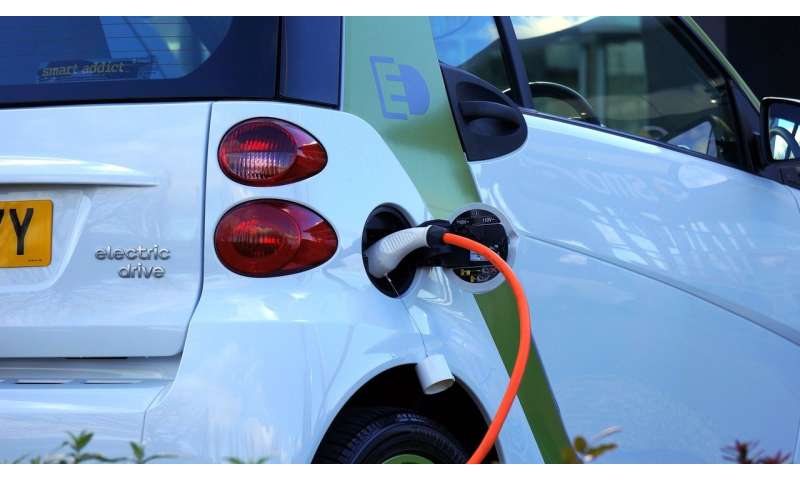
A column from Charles Lane of The Washington Post, which ran in print in The San Diego Union-Tribune on Jan.2, argued that excitement and belief in electric vehicles is overblown.
Lane wrote that mass adoption of electric vehicles will not happen as long as they continue to be more costly than gas vehicles (a "niche product for upper-income folks") and are not worth the government subsidies and transfer of social resources we place on them. He cites research that shows households earning more than $100,000 are the most likely to own electric vehicles.
The San Diego Union-Tribune's Econometer panel considers what the future holds for electric vehicles:
Q: In 10 years, will electric vehicles still be mostly reserved for the wealthy?
Chris Van Gorder, Scripps Health
NO: The technological gains over the next decade will be tremendous, with the mid-2020s promising the greatest advances for EVs. As occurs with most new technologies, EV sticker prices are expected to exceed those of conventional cars until that time. Then, greater manufacturing efficiencies will allow for the production of more affordable vehicles. And the rising cost fossil fuels will create an even larger demand for EVs, to which manufacturers will respond.
Jamie Moraga, IntelliSolutions
NO: A 2019 report by Bloomberg indicated, due to dropping prices for EV batteries, that electric vehicles should be more cost-competitive with combustion-engine cars within three years. According to the same report, EV batteries currently make up nearly 60% of the total cost of electric vehicles. As companies like Tesla continue to expand their markets worldwide, they will achieve lower costs through economies of scale. Increased competition should also help lower prices.
Lynn Reaser, Point Loma Nazarene University
NO: The entry of new producers, economies of scale and the possible return of subsidies could lower the price to that deemed more affordable by middle-income households. The larger issue is whether batteries will be developed to deliver the range consumers demand so they will not be stranded on the side of the road with a dead battery. The availability and costs of necessary rare earth minerals could also limit the EV market.
Phil Blair, Manpower
NO: As an early adopter of electric cars, now on my third, we are seeing almost every car manufacturer frantically working to get their version of an electric car into the market. This competition, and innovative technology, will soon allow for the development of the "all people's" car that the Volkswagen bug was many years ago.
Alan Gin, University of San Diego
NO: Ten years is a long time in terms of technology. Remember that the iPhone was released less than 13 years ago, and compare its current capabilities to the original model. Given the global concern over climate change and the resources being used to deal with it, I expect that there will be major improvements in battery technology that will reduce the cost of electric cars and extend their range, which would make them accessible to the middle class.
Kelly Cunningham, San Diego Institute for Economic Research
NO: Such massive paradigm shift takes time to develop and be widely accepted. Gas powered vehicles originally took much longer to become generally used by the public. Running and maintenance costs are already less than fossil-powered cars. The most expensive component, batteries, have already significantly decreased in price and projected to soon be capable of running a million miles. When costs to purchase and maintain electric vehicles drops below gas vehicles, the transition may seem inevitable.
Gary London, London Moeder Advisors
NO: I would expect that within 10 years the majority of autos will be either electric, hybrid or powered by something other than oil. New technology always starts out initially expensive, then, through mass production and competition, prices drop. Another factor is that there will be battery breakthroughs and other technological improvements which will extend the range and performance of electric vehicles. All of this will happen very soon. It won't take ten years. I'm willing to stake my Tesla on it.
Austin Neudecker, Rev
NO: Decreases in the price of batteries, improved functionality (especially with longevity and range), and volatility in oil prices will make the transition to electric a practical, rather than ideological, decision. The financial tipping-point will not be the same for everyone depending on the distances they drive, regional energy costs, external incentives, etc. Regardless, we should aid the adoption of EVs because the external factors caused by car pollution are severe and affect us all.
James Hamilton, UC San Diego
Not participating this week.
David Ely, San Diego State University
NO: Over the next ten years, many middle-class households will likely purchase electric vehicles. Range will continue to limit demand, but for households who need a second vehicle for commuting to work and running errands, an electric vehicle will become an attractive alternative to a gas-powered one. This will be especially true if the cost of ownership for electric vehicles continues to decline, model choice expands and the infrastructure for recharging improves.
Bob Rauch, R.A. Rauch & Associates
YES: Electric vehicles will continue to be purchased by wealthy individuals for three reasons. One, it is more cost effective to own a gas-powered car as the additional cost of gas does not equal the cost difference between gas-powered and electric vehicles. Two, government subsidies might lapse. Three, the lack of ability of electric cars to go more than 250 miles without a charge creates difficulty. Ten years is not enough time to turn that around.
Norm Miller, University of San Diego
Not participating this week.
©2020 The San Diego Union-Tribune
Distributed by Tribune Content Agency, LLC.
Citation: Will electric cars continue to be mainly for affluent buyers? (2020, January 16) retrieved 16 January 2020 from https://techxplore.com/news/2020-01-electric-cars-affluent-buyers.html
This document is subject to copyright. Apart from any fair dealing for the purpose of private study or research, no part may be reproduced without the written permission. The content is provided for information purposes only.
